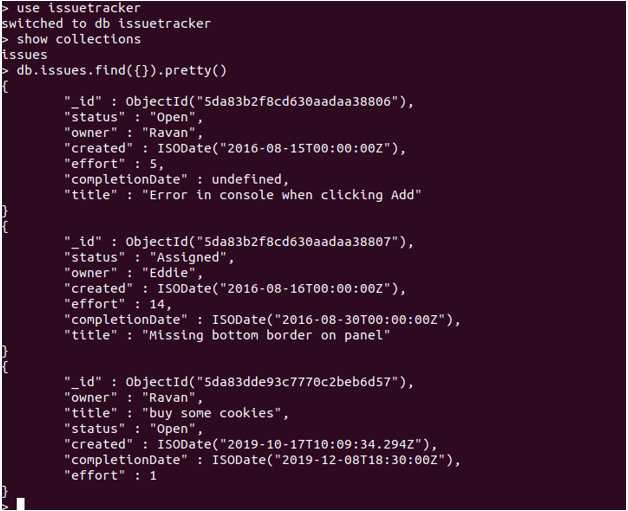MongoDB Tutorial
Home Data Science Data Science Tutorials MongoDB Tutorial
Basics
Commands
Advanced
MongoDB Tutorial and Resources
MongoDB is a document-based database. people call it SQL because it is not a SQL-based database,, or we do not have to write sql queries. Instead, to search or fetch, we can write a regex query. MongoDB stores data in a JSON-like format called BSON. It supports Indexing, Load Balancing, and Sharding. In MongoDB, there are collections to store similar or different data. Because of its storage of JSON-like format after fetching data by server-side language from MongoDB, it need not be required to convert it again into JSON format.
Why do we need to learn MongoDB?
There are multiple reasons why we should learn MongoDB
- First thing, we can easily install and run our system.
- Since MongoDB does not have any schema, we do not have to worry about the schema of our MongoDB; when we run our code according to the fields, we insert that many records will be created in the MongoDB collection Which also reduces memory size.
- Because it holds data in the BSON(Binay JSON), it’s very fast in serving data to a server, as a server is directly getting data that it needs instead of parsing and sending it to the client-side.
- Because of document query support, it is a great dynamic query.
- We can scale MongoDB easily.
- We do not have to worry about complex JOIN queries like SQL.
- Because of NoSQL, we do not have to worry about sql injection, so less security problems.
- We can achieve load balancing very easily in MongoDB.
- We can do searching in MongoDB by regex and fields.
- We can use MongoDB as a windows service.
- VM is not required to run MongoDB.
- Support for Sharding is available in MongoDB.
Note: Sharding is a way to store data. In this case, if data size grows, it can be scaled here; scaling happens horizontally. In simple words, if one machine cannot hold data,, we can use multiple machines for it.
Applications of MongoDB
MongoDB mostly used in Web applications to store data. It is Mostly and highly used by express JS, NodJS, and AngularJS because Node JS is Javascript, and we know Javascript is more comfortable with JSON, and we know MongoDB is Already JSON.
Example
Let me explain one short example of fetching data from MongoDB collection. Suppose our collection name issues. In the below example, we are fetching data from a collection called issues, and we used the pretty() function to display data in a better format.
db.issues.find({}).pretty()
Output :
{
"_id" : ObjectId("5da83b2f8cd630aadaa38806"),
"status" : "Open",
"owner" : "Ravan",
"created" : ISODate("2016-08-15T00:00:00Z"),
"effort" : 5,
"completionDate" : undefined,
"title" : "Error in console when clicking Add"
}
{
"_id" : ObjectId("5da83b2f8cd630aadaa38807"),
"status" : "Assigned",
"owner" : "Eddie",
"created" : ISODate("2016-08-16T00:00:00Z"),
"effort" : 14,
"completionDate" : ISODate("2016-08-30T00:00:00Z"),
"title" : "Missing bottom border on panel"
}
{
"_id" : ObjectId("5da83dde93c7770c2beb6d57"),
"owner" : "Ravan",
"title" : "buy some cookies",
"status" : "Open",
"created" : ISODate("2019-10-17T10:09:34.294Z"),
"completionDate" : ISODate("2019-12-08T18:30:00Z"),
"effort" : 1
}Output:
Prerequisites
So to learn MongoDB, you do not need to know the SQL query, you need to have a basic understanding of data and regex operations.
Target Audience
There would be two targets Audience given below:
Database Admin: A database Admin can deal with creating new users, granting some access to those users, checking performance, and scaling MongoDB.
Web Developer: A web Developer can store data which it is getting from various sources and also displaying stored data to various end-users and for scripting.

Let’s Get Started
By signing up, you agree to our Terms of Use and Privacy Policy.

Watch our Demo Courses and Videos
Valuation, Hadoop, Excel, Web Development & many more.


EDUCBA Login
This website or its third-party tools use cookies, which are necessary to its functioning and required to achieve the purposes illustrated in the cookie policy. By closing this banner, scrolling this page, clicking a link or continuing to browse otherwise, you agree to our Privacy Policy

